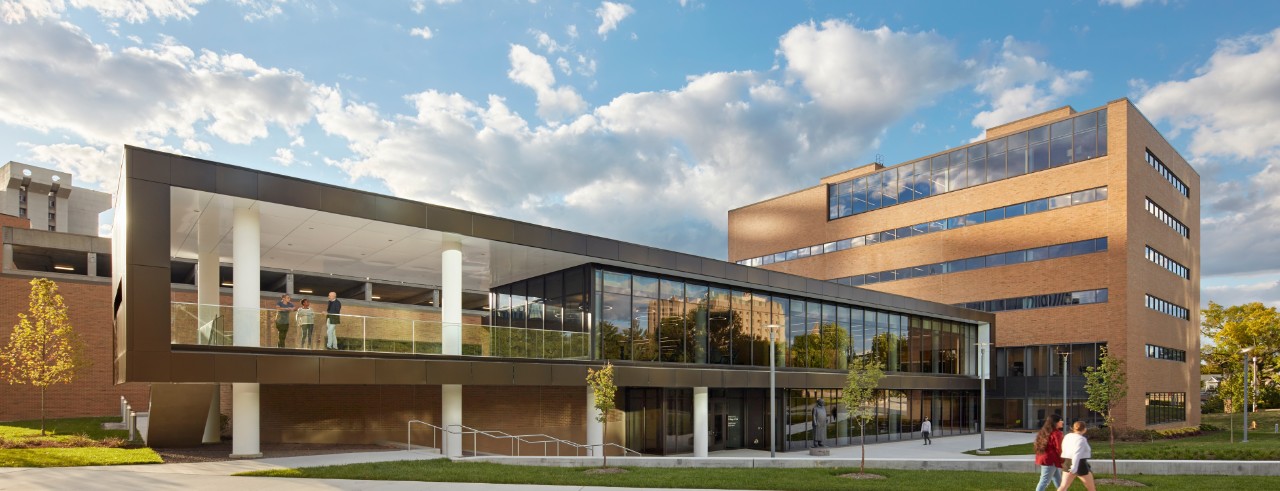
Ongoing quest for justice a life-changer for all parties
The Ohio Innocence Project and its student fellows, past and present, recently marked 20 years working to exonerate the wrongfully convicted.
Everyone can relate to being blamed or punished for something you didn’t do. It stirs a mix of anger, confusion, frustration, helplessness. But imagine the physical and psychological gauntlet experienced by those on the short end of the worst cases within the criminal justice arena.
One select group of people probably understands their plight better than most, given how fully they invest themselves in trying to right these wretched wrongs. The 400-plus University of Cincinnati College of Law alumni who have served as student fellows with the Ohio Innocence Project (OIP), housed within the Law school, have collectively secured the release of 42 innocent prisoners over OIP’s 20-year history. The fellows’ collective legacy thus far was celebrated at a Fellows Reunion held Dec. 1 at the College of Law.

UC Alumni and former OIP fellows at the Fellows Reunion on Dec. 1. Photo/provided.
When OIP began in 2003, it was the College of Law’s first clinic, which means that students do most of the work. With 26 students becoming new OIP fellows each year, about one in five law students directly participate in this signature initiative, which adds to UC’s sterling reputation for experiential learning.
Any OIP fellow, past or present, can describe the extraordinary challenges that go with the job — the tedious way that details must be handled, the roller coaster ups and downs that torment the psyche, the resilience required by the maze-like journeys that cases become, and the sobering recognition of the human stakes involved. You’re light years away from those crime/courtroom TV shows and movies that may have once influenced your career choice. Nothing here is tidily wrapped up in an hour or two. The actual criminal justice system tends to confound as much as it convicts or acquits, especially in the post-conviction world. So if you ask anyone involved with OIP what they consider the highest of the highs, they’ll likely cite those moments when wrongfully convicted inmates receive their releases following years of the fellows’ exhaustive legal legwork to prove their innocence.
Recently, OIP co-founder and director Mark Godsey, as well as past OIP fellows Eric Eckes, Law ’08, and Simar Khera, Law ’15, spoke about their shared experience and its life-changing impact.
Unique proving ground shapes careers
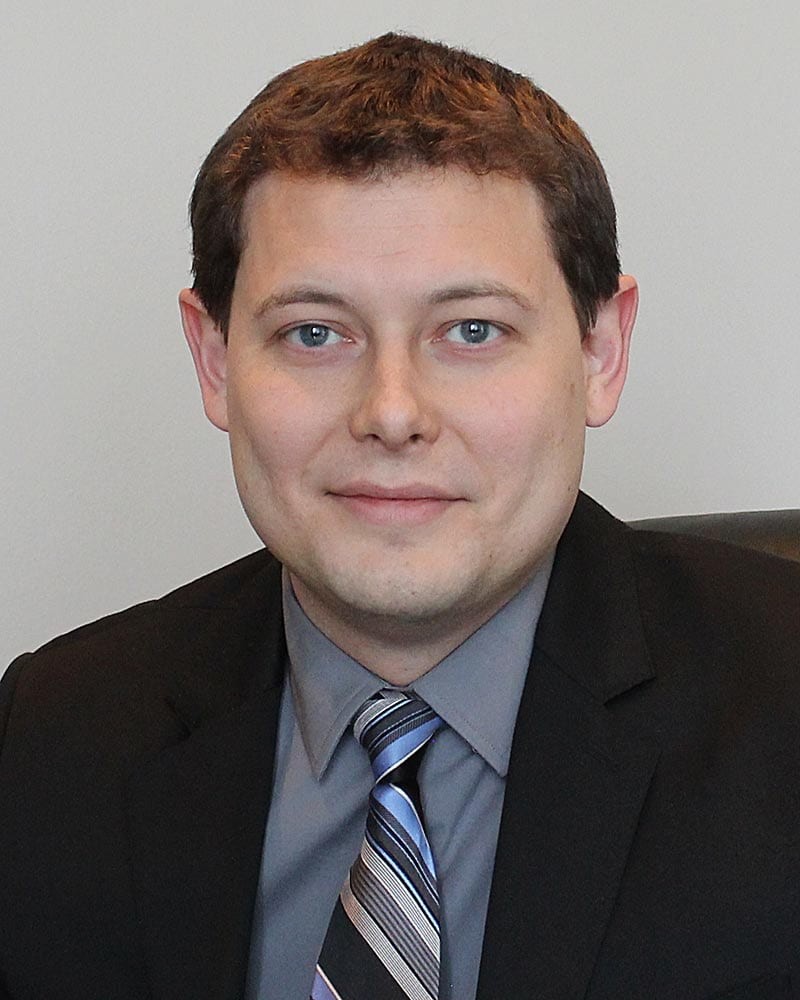
Eric Eckes, Law ’08. Photo/provided.
A year spent on the OIP team shapes how you see and respond to the hard realities of a challenged justice system, regardless of the role you may be destined to play.
A fellow in OIP’s early years, Eric Eckes has built a successful career as a criminal defense attorney, working for the firm of Pinales Stachler Young Burrell in his native Cincinnati. He admits there has always been something within him that wants to fight for the underdog.
“Generally speaking, I kind of knew what path I was taking with law school,” he said. “I didn’t know I would go into the public defender’s office and things of that nature. I was pretty darn sure I wasn’t going to be a prosecutor.”
Figuratively sitting at the table on the opposite side of the aisle is Simar Khera. Nearly a decade after her time with OIP, she is an Assistant U.S. Attorney for the Northern District of Illinois.
“I knew for a long time that I wanted to be a prosecutor, never saw myself as a defense attorney,” she said. “But while this was always the track I thought I’d take, I didn’t know what that meant until I was a fellow with the Ohio Innocence Project. You can talk about justice and what that means, but until you see the devastating impact of a true miscarriage of justice, I don’t think you can really understand the ramifications that follow, and the power a prosecutor holds. That intensified my passion for wanting to be a prosecutor.”
Mark Godsey sees the legal yin and yang represented by Eckes and Khera as illustrative of OIP’s unique role and character.
“A benefit of doing this work at OIP is that it helps them understand that things aren’t always what they appear to be, and you can’t just accept what you’re being told,” Godsey said. “That’s a good lesson no matter what area you go into or what you end up doing. But I don’t think people understand the depths to which the system appears to be broken until you really start diving into it.”
Each February, first-year law students interview with OIP staff, then with current fellows in their quest to succeed them. Grades aren’t necessarily a key factor toward being chosen; rather, candidates must exhibit a certain energy and passion — a bit of a bulldog, Godsey says. “Sometimes a case is broken open because of a particular personality and a particular passion that was in the right place at the right time.”

Simar Khera, Law ’15. Photo/provided.
Khera recalls doing some timely reading prior to deciding to apply to become a fellow.
“I had read 'The Innocent Man' by John Grisham and included that in my cover letter. So it was an amazing, full-circle moment when Grisham was there for OIP’s 20-year anniversary in May.”
Those selected win the privilege of rolling up their sleeves and doing OIP’s decidedly unglamorous, in-the-trenches work for a solid year. It’s not for everyone. New fellows start their duties immediately after Memorial Day, working primarily in pairs and plunging into the cases they’ve inherited from the departing class of fellows. They make phone calls. They write letters. They make phone calls. They meet with inmates. They make phone calls. They track down witnesses and potential evidence, often from decades ago. They make phone calls.
“Being so immersed that first summer is our ‘secret sauce’ because we have their undivided attention the whole time,” Godsey said. “This is their paid, full-time job, and we put them on a steep learning curve. It’s like learning a foreign language by just going to another country where you have to figure it out quickly. By the end of the summer, they’re like mini-lawyers. They know how to handle these cases. And when the school year starts and they’re back into their classes, they work part-time but they’re proficient. That intense summer allows them to operate at a high level, which the work requires.”
Each team of two has a docket of about 30 cases, with some continually being dropped and others added according to available evidence. Of those, several are cases where innocence has been largely established to the best of OIP’s knowledge and therefore are in active litigation. A half dozen or so look promising but more intense investigation is needed. The rest are being extensively vetted. Typically years beyond their convictions, most potential clients have no legal representation, so it’s usually family or friends who reach out to inquire about possibly becoming an OIP case.
Nuts and bolts become flesh and blood
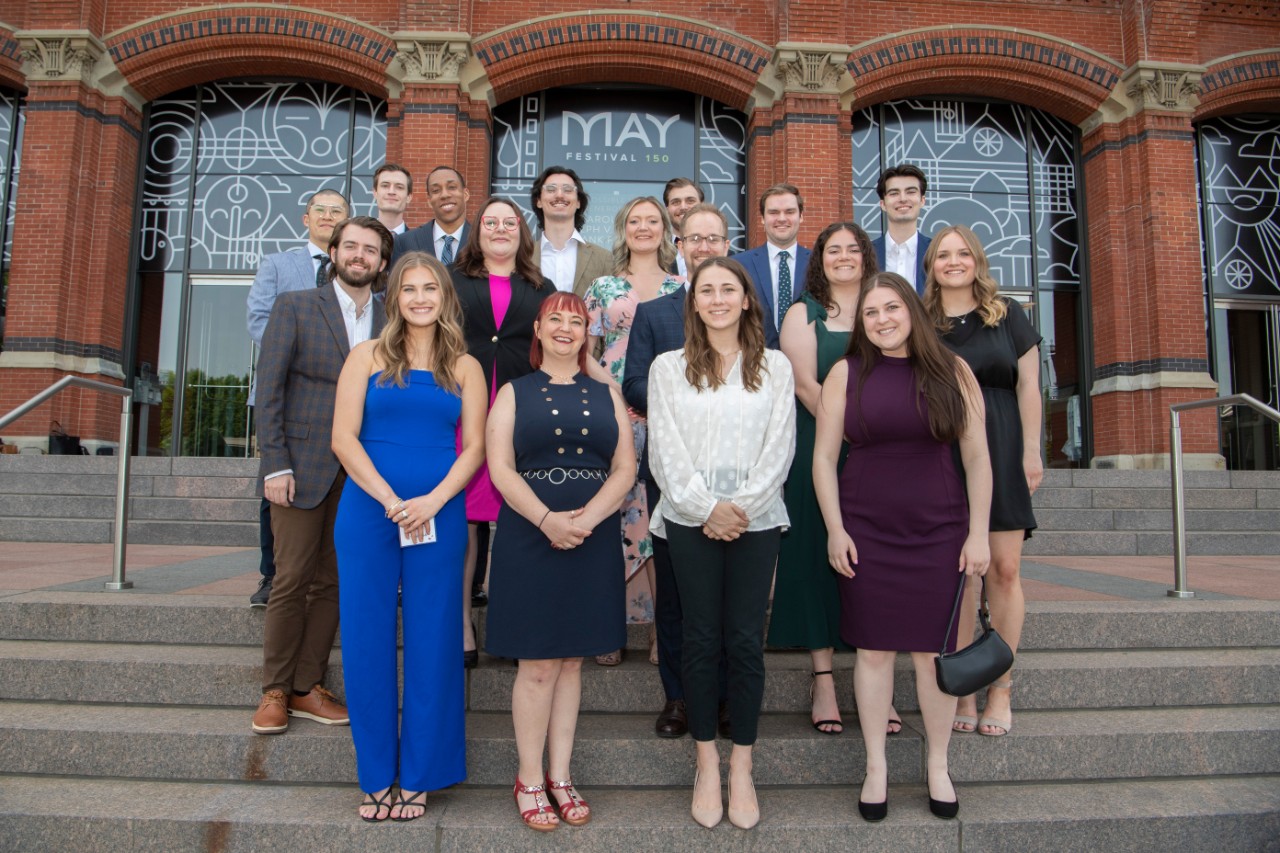
OIP 20th Anniversary Gala attendees included representatives from the 2022-23 and 2023-24 classes of fellows whose hard legwork sustains OIP’s collective efforts to exonerate the wrongfully convicted. Photo/provided.
New fellows are almost always jarred by the way the cases handed to them gradually become actual people whose pain and anguish is laid bare.
“It’s one thing to read about wrongful convictions and people’s journeys,” Khera said, “but to hear it firsthand from people you’ve gotten to know and developed a personal connection with, that’s extremely difficult. I still sometimes think about things Dean Gillispie told us about his experience in prison, and especially his experience after being released. That sticks with you.”
Eckes remembers that his driving purpose — to fight against a system that too often fails to give the accused a fair shake — seemed a bit futile right out of the gate. It served to reinforce Godsey’s warning about trusting what you see, hear or want to believe. His very first day as a fellow found him at the Court of Appeals where an OIP staff attorney was arguing a case to get DNA testing approved.
"She won fairly quickly, we got the DNA testing and we were good to go,” Eckes said. “The only problem was that our client turned out to be pretty darn guilty. It was his DNA there, and then that happened several times more in other cases. So for me, the beginning was just helping prove people guilty for a while.”
The average exoneration takes about seven years from when the case is initially received and vetted by OIP to when the inmate is set free. Godsey says up to four years may be spent determining the person’s actual innocence such that OIP will fight for them. That means many pairs of fellows will have worked on the typical case, relay-style, before relinquishing it, often very reluctantly, to their successors.
Unsurprisingly, their shared investment and visceral experiences create bonds between fellows that may last forever. And when a case successfully crosses the finish line, the exoneree’s victory is keenly felt by everyone who has carried the baton.
“It’s a strong, close-knit network,” Khera said. “I don’t know of any OIP fellow who isn’t following OIP on social media. And a number of the fellows in my class remain some of my very best friends.”
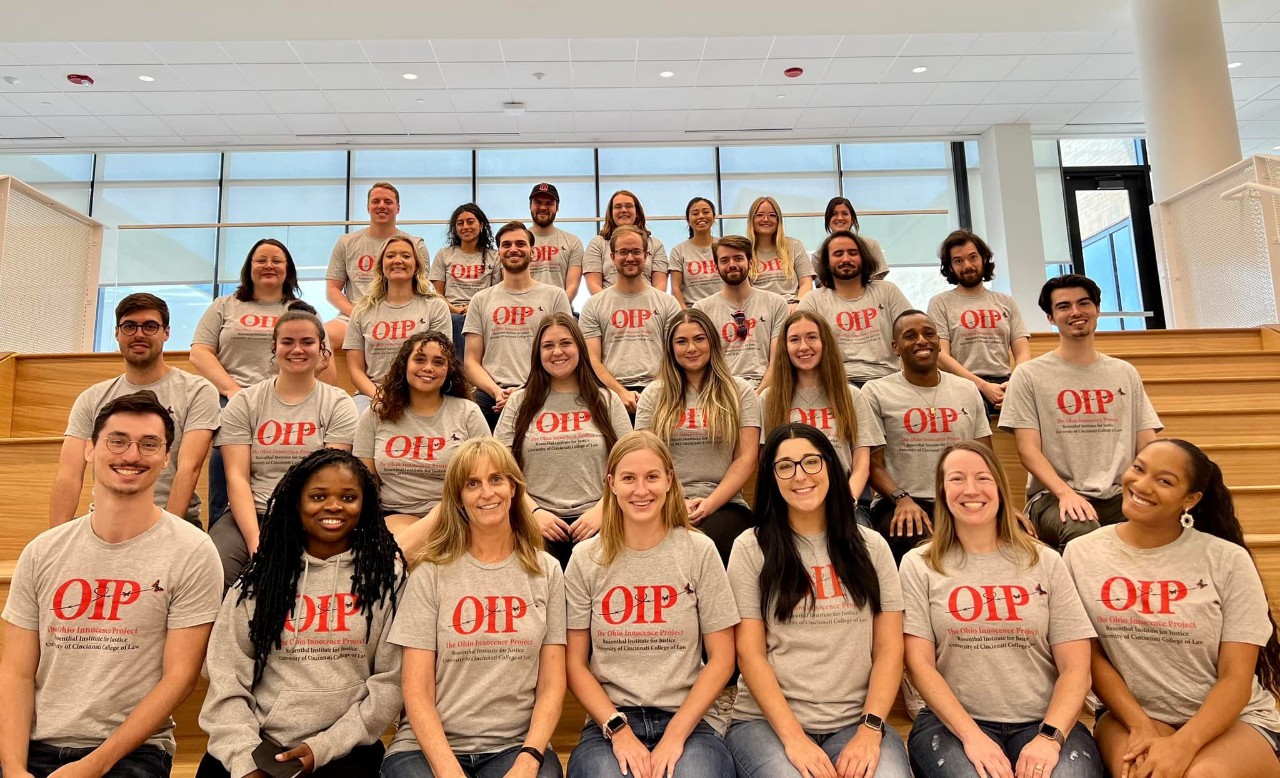
When the 2022-23 cohort of OIP fellows, above, passed the baton to their 2023-24 counterparts last spring, they further extended the line of Cincinnati Law’s OIP student-advocates. Photo/provided.
Swimming against the tide of the system
Through their work, OIP fellows confront a sobering fact: The justice system, and the human beings who populate it, can be ironic obstacles to seeing justice done. That’s usually why innocent people are imprisoned in the first place. The system is built around the binary Guilty or Not Guilty, but the process can’t always live up to the standard, and the wrongly convicted pay the steepest price.
“Those waters are difficult to navigate,” admitted Eckes. “I think certainty leads to a lot of problems. The state’s certainty that they’re right. The judge’s certainty that everything’s going to be correct. The certainty in courts of appeals — ‘If the jury found him guilty, this person must be guilty.’ In my career, it’s rare that I get a case where I’m certain of what actually happened in the past.”
It’s tempting to imagine “villains” scattered throughout the criminal justice system, scheming to mete out unjust punishment. Eckes sees a less malevolent but more pervasive culprit.
“It’s human nature,” he said. “This ball gets rolling and it doesn’t allow for reflection. We’ve got the malleability of human memory. We’ve got the perseverance of prejudice. We’ve got the prevalence of confirmation bias. There’s a sense of ‘I’m doing the just thing, I’m the one locking up the bad guys.’ The system is almost built to where you’re offending it if you suggest that your client didn’t do it.”
Then he added, “You know, the concept of justice is very flexible to almost all people. Justice is what you feel it is at the moment. The system crushes ambiguity, like there’s no such thing permitted in the courtroom. But the courtroom is about life, and life is about ambiguity.”
Khera knows failures can occur along the way. She’s seen it — from the initial investigation through the trial and ultimate verdict, and she is determined to help protect the integrity of the process.
“The criminal justice system is not infallible,” she said. “Humans will make mistakes, which can have dire consequences.”

At the Ohio Innocence Project’s 20th Anniversary Gala in the spring of 2023, OIP co-founder and director Mark Godsey expressed his gratitude for the students, staff, donors, alumni and other supporters for the initiative’s ongoing success. Photo/provided.
Mark Godsey’s greatest joy comes when exonerees are set free, but like his OIP alumni, his greatest disappointment is born of the legal morass that imprisoned them to begin with, and the labyrinth his team must navigate to right the original wrong, albeit many years too late.
“You look at some cases and you’re just baffled," Godsey said. "And it’s a lot of things. The field is underfunded, so a lot of people in the criminal justice system aren’t paid very much. You have the human tendency to go through the motions after a while. You’ve got racial bias. You’ve got politics. You’ve got outside factors, human factors, system factors.
"There are things that you may not be aware are happening because you’re conditioned to not be aware. This is what the system has been doing for a long time, and people think, 'Who am I to question the way the system works?'"
For her sake, Khera knows her OIP experience raised her consciousness about this frustrating aspect of her profession.
“If someone becomes a prosecutor but doesn’t believe there are people wrongfully convicted, that’s deeply problematic,” she said. “That’s something every prosecutor should remember as they’re prosecuting cases. We have to be incredibly diligent.”
But isn’t it a prosecutor’s job to gain convictions? Khera bristles at that idea. She sees the goal of everyone in the criminal justice system as making sure justice is served — not in name or appearance but in fact.
“The purpose of a prosecutor is not your conviction rate. It is doing justice — whatever justice means in that situation, case by case.”
She sees substantial overlap in what prosecutors, defense attorneys, judges and law enforcement officials all are charged to do. The common ground is seeing justice done, which should compel all parties to take great care to guard against preventable errors that undermine the joint mission. Everyone shares the responsibility.
OIP strategically playing the long game
In an ecosystem containing OIP staff and fellows (both current students and alumni), the donors who provide much of the necessary funding, and other supporters who enable OIP’s work to thrive, perhaps the most compelling cohort is the exonerees themselves.
“After I was a fellow, I went back and volunteered during my 3L year and ended up traveling with them for an exoneration,” Khera said. “Dean [Gillispie] and several other exonerees were there. When the client came out and was released, they were all shaking his hand and telling him how many years they had wrongfully been imprisoned. It was just so powerful.
“And to see the absolute grace with which so many of them have handled their situation. It’s incredible when you consider what they’ve just gone through. Like, Ray Towler is one of the most amazing people I have ever met. He is an absolute ball of light in this world. The house he has started for exonerees … He could have been incredibly bitter over what had happened to him — just taken the money he got and kept it for himself. But to give back to the exoneree community is just unbelievable.”

Former OIP clients Derrick Wheatt, Laurese Glover and Eugene Johnson, collectively known as the East Cleveland Three, spoke with students at an OIP-u event at Tiffin University about their case. Photo/provided.
After two decades of incredibly hard work to help create such success stories, what’s next for the Ohio Innocence Project?
Mark Godsey sees more growth and exonerations, but he feels the more relevant question may be: What does the future of the system and our cause look like? He knows there’s more happening in his shop than immediately meets the eye, as OIP gradually shines more light on a crucial topic.
“Strange as it might sound, the cases themselves aren’t the most important thing,” he said. “I mean, we’re freeing an innocent person — that’s extremely important. But change takes decades, and educating younger people is the most important part. For example, we started OIP-u — like how ESPNU is the channel for college sports. OIP-u has 20 chapters now at colleges around Ohio, with programs to spread awareness, hold events, have exonerees come and speak, and infuse these issues into the classroom. And here, we make sure everyone who goes through the Law school is touched by this issue, and we hope for the same at these other colleges.”
Of OIP’s 26 yearly fellows, 20 research and ultimately help litigate cases, as Eckes and Khera did. The other six are policy fellows involved exclusively in education and outreach — conducting empirical research into relevant issues, drafting reforms and proposed legislation, staging public awareness events, and collaborating with foreign visitors who may be trying to start Innocence Projects abroad. Seen as a worldwide leader in its field, OIP is very involved in this international expansion.
“Perhaps most importantly, OIP will continue to send attorneys out into the field — future leaders who have had their eyes opened,” Godsey added. “More than the actual cases, that’s the ultimate change agent.”
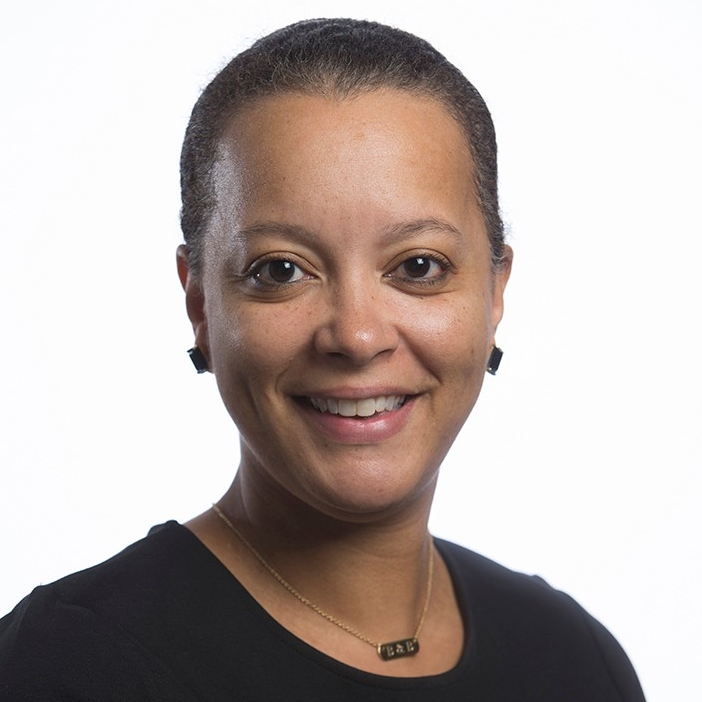
Shelley Johnson
Senior Director, Alumni Engagement, College of Law
Featured image at top: Exterior of College Law. Provided/Perkins + Will
Related Stories
President Pinto's 2021 year-in-review message
December 17, 2021
University of Cincinnati President Neville G. Pinto looks back on a historic year that brought students, faculty, staff and the community back together like never before.
Uplifting stories help #UCtheGood
July 16, 2020
UC Marketing + Communications gathers recent uplifting stories to help the community focus on the good during coronavirus pandemic.
UC’s $10.6 billion impact
May 9, 2023
The University of Cincinnati delivers a significant economic boost to the region and state of Ohio thanks to alumni impact, operations and research spending, student demand for goods and services, launch of startup companies and more.